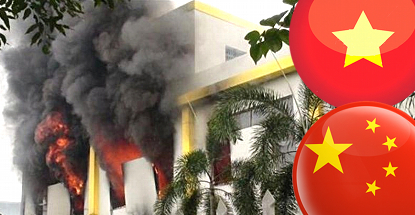 Donaco International Ltd. issued a note to investors on Friday stating that business at its Lao Cai International Hotel and casino in northern Vietnam had not been affected by the recent political tensions between Vietnam and China. The Lao Cai is located on the border with China’s Yunnan province and since Vietnam bars locals from entering casinos, the Lao Cai depends almost entirely on Chinese gamblers crossing the border.
Donaco International Ltd. issued a note to investors on Friday stating that business at its Lao Cai International Hotel and casino in northern Vietnam had not been affected by the recent political tensions between Vietnam and China. The Lao Cai is located on the border with China’s Yunnan province and since Vietnam bars locals from entering casinos, the Lao Cai depends almost entirely on Chinese gamblers crossing the border.
The Lao Cai had reported record-high table game revenue in the first quarter of 2014 and Friday’s note said the number of players visiting the property in April and through the first half of May had been “at normal levels.” Donaco’s soft opening of Lao Cai’s phase two – featuring a twelve-fold increase in the number of hotel rooms and an unspecified number of extra gaming tables – is taking place Sunday (18) and Donaco felt the need to reassure investors that Chinese gamblers were “continuing to cross the border freely.”
Chinese nationals are also freely crossing the Vietnamese border at other transit points, but the traffic is almost entirely heading out of Vietnam. Chinese nationals in Vietnam found themselves under attack last week as local anger grew over Chinese oil giant CNOOC planting a mobile oil-drilling rig in a disputed area in the South China Sea. China has sent military vessels to defend the rig from any interference from Vietnamese authorities who claim the territory – just 220km off Vietnam’s coastline – as their own.
Anger over China’s increasingly aggressive territorial claims led to rioting in many areas in Vietnam last week, with many Chinese-owned businesses looted and burned. At least two Chinese citizens were reported killed and over 100 others injured. Vietnamese authorities have since cracked down on the rioting, arresting over 1k individuals and vowing to protect foreign nationals, but many Chinese have decided they’re not sticking around to see if the worst is truly over.
While the strife may be bad news for Donaco, it may also provide extra impetus for Vietnam to lift its ban on locals entering casinos. Most large resort casinos in Asia depend on a steady influx of Chinese gamblers but Vietnam and China have a turbulent history, and while this latest flare-up may eventually cool, China’s aggressive territoriality will ensure relations between the two countries remain frosty. If Vietnam is serious about enticing international casino operators to spend billions setting up shop in the country, locals are going to have to be allowed in, because the flow from the Chinese taps can be turned off at any time.
